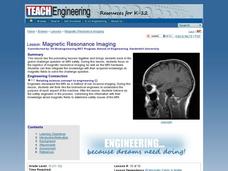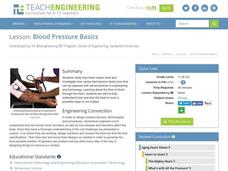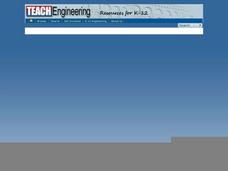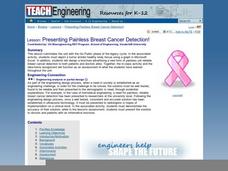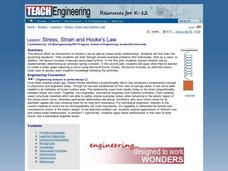Teach Engineering
The Mighty Heart
Have your class follow the step-by-step directions in this resource to dissect a sheep heart and gain a better understanding of this amazing organ. Working in small groups, pupils look for specific parts of the heart during their...
Teach Engineering
Exploring Bone Mineral Density
Bone up on bone density. The second installment of the seven-part series has pupils read articles on two different websites to learn about bone density and its measurement, as well as X-rays and other imaging tools. A quiz assesses their...
Teach Engineering
A Shot Under Pressure
You've got to pump it up! Using the equations for projectile motion and Bernoulli's Principle, class members calculate the water pressure in a water gun. The pupils collect data on the number of pumps and distance traveled in order to...
Teach Engineering
Curb the Epidemic!
Class members use an applet on the Internet to simulate the spread of a disease. The simulation allows individuals to determine two nodes to vaccinate to limit the number of nodes infected. By running several simulations, scholars can...
Teach Engineering
Flame Test: Red, Green, Blue, Violet?
Let the true colors shine through. Pupils conduct a flame test to identify an unknown element. Class members calculate and prepare specific molarity solutions of three chemicals. Using their observations of the colors emitted, they...
Teach Engineering
Magnetic Resonance Imaging
The capstone activity in a 14-part series focuses on the basics of magnetic resonance imaging and the hardware of the machines. Pupils use this information and the material learned throughout the unit to develop a presentation on safety...
Teach Engineering
It's Tiggerific!
Spring into elastic potential energy with a lesson that provides background information on determining the elastic potential energy of springs and other elastic materials. General energy equations emphasize the conservation of energy and...
Teach Engineering
Cell Membrane Structure and Function
Teach your class how to get out of a cell — or break in. The third installment in a seven-part series introduces the class to cell membranes and their functions. The lesson plan includes information to present to the class,...
Teach Engineering
Light Intensity Lab
Let there be light. The last installment of a seven-part series has pupils conduct an experiment on light attenuation through different numbers of transparency sheets. They then relate the results back to how X-rays measure bone density.
Teach Engineering
How Antibiotics Work
Take two pills and call me in the morning. The first lesson in a short unit of four introduces class members to delivery methods of medicines. The instruction introduces the question of which delivery method is best to get you feeling...
Teach Engineering
Blood Pressure Basics
Under pressure! The second lesson of the series introduces the class to blood pressure and the impact of high blood pressure on the cardiovascular system. It helps learners make the connection between blood pressure and how the heart...
Teach Engineering
Common and Natural Logarithms and Solving Equations
Log some practice with logarithms. A PowerPoint presentation provides a tutorial on the change of base formula involving natural logarithms and solving exponential equations with logarithms in the fourth installment of a seven-part...
Teach Engineering
Bone Mineral Density Math and Beer's Law
Hop into a resource on Beer's Law. A PowerPoint presentation introduces Beer's law as part of calculating bone density from X-ray images in the sixth instructional activity in the series of seven. Individuals work on practice problems...
Teach Engineering
Pill Dissolving Demo
Plop, plop, fizz, fizz, oh that one is the fastest. The teacher demonstration is the second part of a four-part series. The class observes how different pill types dissolve in simulated stomach acid. They determine which one dissolves...
Teach Engineering
May the Magnetic Force Be with You
Class members use mathematics in order to better understand magnetic forces and their interaction on charged particles. After a demonstration of the interaction between a magnet and an electron beam using a CRT computer monitor, learners...
Teach Engineering
Bone Density Math and Logarithm Introduction
What do logarithms have to do with bone density? Scholars learn that the equation for bone density includes logarithms. The majority of the third lesson of seven is devoted to logarithms and their properties.
Rice University
Intermediate Algebra
Algebra concepts are all wrapped up in one nice bow. The resource combines all the concepts typically found in Algebra I and Algebra II courses in one eBook. The topics covered begin with solving linear equations and move to linear...
Discovery Education
Market Research and Design: The Headphone Challenge
Watch augmented reality bring classrooms to life. Scholars work in groups to design, build, and market a new pair of headphones meant for children under three. They use an augmented reality app to show their headphones in action as they...
Curated OER
Detecting Breast Cancer
Students develop a painless means for identifying cancerous tumors. In this imaging lesson students list the information that may be needed to answer the problem.
Curated OER
The Strongest Pump of All
Students examine how the heart functions and the concept of how electrical currents can affect muscle contractions. In this cardiovascular lesson students identify P, QRS and T complexes.
Curated OER
Presenting Painless Breast Cancer Detection!
Students depict a tumor inside a healthy body using a graph in Microsoft Excel. in this breast cancer lesson plan, students also design a brochure that advertises a new form of painless breast cancer treatment.
Curated OER
Protecting the Mummified Troll
Learners develop an invisible security system to protect a mummified troll. In this security system lesson students view a portion of Mythbusters and begin their challenge.
Curated OER
Stress, Strain and Hooke's Law
Students study Hooke's Law and stress-strain relationships. In this spring lesson students create a strain graph in Microsoft Excel.
Teach Engineering
Thrown for a Loop
Round and round it goes. Class members observe a current carrying loop in a magnetic field and calculate its associated torque. They then apply what they have learned to example problems to solve for the torque and to calculate the...







